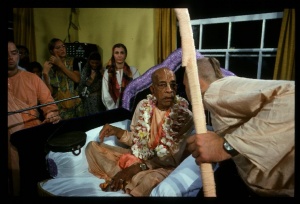SB 4.28.47: Difference between revisions
m (1 revision(s)) |
(Vanibot #0054 edit - transform synonyms into clickable links, which search similar occurrences) |
||
| (One intermediate revision by one other user not shown) | |||
| Line 1: | Line 1: | ||
{{info | {{info | ||
|speaker= | |speaker=Nārada Muni | ||
|listener=King | |listener=King Prācīnabarhiṣat | ||
}} | }} | ||
[[Category:Srimad-Bhagavatam - Canto 04 Chapter 28]] | |||
[[Category:Bhagavatam Verses Spoken by Narada Muni - Vanisource|042847]] | |||
<div style="float:left">'''[[Srimad-Bhagavatam]] - [[SB 4|Fourth Canto]] - [[SB 4.28: Puranjana Becomes a Woman in the Next Life|Chapter 28: Purañjana Becomes a Woman in the Next Life]]'''</div> | |||
<div style="float:right">[[File:Go-previous.png|link=SB 4.28.46]] '''[[SB 4.28.46]] - [[SB 4.28.48]]''' [[File:Go-next.png|link=SB 4.28.48]]</div> | |||
{{RandomImage}} | |||
==== TEXT 47 ==== | ==== TEXT 47 ==== | ||
<div | <div class="verse"> | ||
ātmānaṁ śocatī dīnam | :ātmānaṁ śocatī dīnam | ||
abandhuṁ viklavāśrubhiḥ | :abandhuṁ viklavāśrubhiḥ | ||
stanāv āsicya vipine | :stanāv āsicya vipine | ||
susvaraṁ praruroda sā | :susvaraṁ praruroda sā | ||
</div> | </div> | ||
| Line 16: | Line 22: | ||
==== SYNONYMS ==== | ==== SYNONYMS ==== | ||
<div | <div class="synonyms"> | ||
''[//vanipedia.org/wiki/Special:VaniSearch?s=ātmānam&tab=syno_o&ds=1 ātmānam]'' — about herself; ''[//vanipedia.org/wiki/Special:VaniSearch?s=śocatī&tab=syno_o&ds=1 śocatī]'' — lamenting; ''[//vanipedia.org/wiki/Special:VaniSearch?s=dīnam&tab=syno_o&ds=1 dīnam]'' — wretched; ''[//vanipedia.org/wiki/Special:VaniSearch?s=abandhum&tab=syno_o&ds=1 abandhum]'' — without a friend; ''[//vanipedia.org/wiki/Special:VaniSearch?s=viklava&tab=syno_o&ds=1 viklava]'' — brokenhearted; ''[//vanipedia.org/wiki/Special:VaniSearch?s=aśrubhiḥ&tab=syno_o&ds=1 aśrubhiḥ]'' — by tears; ''[//vanipedia.org/wiki/Special:VaniSearch?s=stanau&tab=syno_o&ds=1 stanau]'' — her breasts; ''[//vanipedia.org/wiki/Special:VaniSearch?s=āsicya&tab=syno_o&ds=1 āsicya]'' — wetting; ''[//vanipedia.org/wiki/Special:VaniSearch?s=vipine&tab=syno_o&ds=1 vipine]'' — in the forest; ''[//vanipedia.org/wiki/Special:VaniSearch?s=susvaram&tab=syno_o&ds=1 susvaram]'' — loudly; ''[//vanipedia.org/wiki/Special:VaniSearch?s=praruroda&tab=syno_o&ds=1 praruroda]'' — began to cry; ''[//vanipedia.org/wiki/Special:VaniSearch?s=sā&tab=syno_o&ds=1 sā]'' — she. | |||
</div> | </div> | ||
| Line 23: | Line 29: | ||
==== TRANSLATION ==== | ==== TRANSLATION ==== | ||
<div | <div class="translation"> | ||
Being now alone and a widow in that forest, the daughter of Vidarbha began to lament, incessantly shedding tears, which soaked her breasts, and crying very loudly. | Being now alone and a widow in that forest, the daughter of Vidarbha began to lament, incessantly shedding tears, which soaked her breasts, and crying very loudly. | ||
</div> | </div> | ||
| Line 30: | Line 36: | ||
==== PURPORT ==== | ==== PURPORT ==== | ||
<div | <div class="purport"> | ||
Figuratively the queen is supposed to be the disciple of the king; thus when the mortal body of the spiritual master expires, his disciples should cry exactly as the queen cries when the king leaves his body. However, the disciple and spiritual master are never separated because the spiritual master always keeps company with the disciple as long as the disciple follows strictly the instructions of the spiritual master. This is called the association of vāṇī (words). Physical presence is called vapuḥ. As long as the spiritual master is physically present, the disciple should serve the physical body of the spiritual master, and when the spiritual master is no longer physically existing, the disciple should serve the instructions of the spiritual master. | Figuratively the queen is supposed to be the disciple of the king; thus when the mortal body of the spiritual master expires, his disciples should cry exactly as the queen cries when the king leaves his body. However, the disciple and spiritual master are never separated because the spiritual master always keeps company with the disciple as long as the disciple follows strictly the instructions of the spiritual master. This is called the association of ''vāṇī'' (words). Physical presence is called ''vapuḥ''. As long as the spiritual master is physically present, the disciple should serve the physical body of the spiritual master, and when the spiritual master is no longer physically existing, the disciple should serve the instructions of the spiritual master. | ||
</div> | </div> | ||
__NOTOC__ | |||
<div style="float:right; clear:both;">[[File:Go-previous.png|link=SB 4.28.46]] '''[[SB 4.28.46]] - [[SB 4.28.48]]''' [[File:Go-next.png|link=SB 4.28.48]]</div> | |||
__NOTOC__ | |||
__NOEDITSECTION__ | |||
Latest revision as of 21:44, 18 February 2024

A.C. Bhaktivedanta Swami Prabhupada
TEXT 47
- ātmānaṁ śocatī dīnam
- abandhuṁ viklavāśrubhiḥ
- stanāv āsicya vipine
- susvaraṁ praruroda sā
SYNONYMS
ātmānam — about herself; śocatī — lamenting; dīnam — wretched; abandhum — without a friend; viklava — brokenhearted; aśrubhiḥ — by tears; stanau — her breasts; āsicya — wetting; vipine — in the forest; susvaram — loudly; praruroda — began to cry; sā — she.
TRANSLATION
Being now alone and a widow in that forest, the daughter of Vidarbha began to lament, incessantly shedding tears, which soaked her breasts, and crying very loudly.
PURPORT
Figuratively the queen is supposed to be the disciple of the king; thus when the mortal body of the spiritual master expires, his disciples should cry exactly as the queen cries when the king leaves his body. However, the disciple and spiritual master are never separated because the spiritual master always keeps company with the disciple as long as the disciple follows strictly the instructions of the spiritual master. This is called the association of vāṇī (words). Physical presence is called vapuḥ. As long as the spiritual master is physically present, the disciple should serve the physical body of the spiritual master, and when the spiritual master is no longer physically existing, the disciple should serve the instructions of the spiritual master.